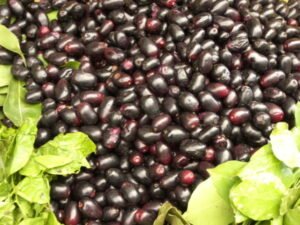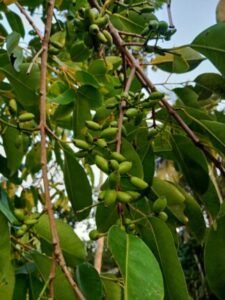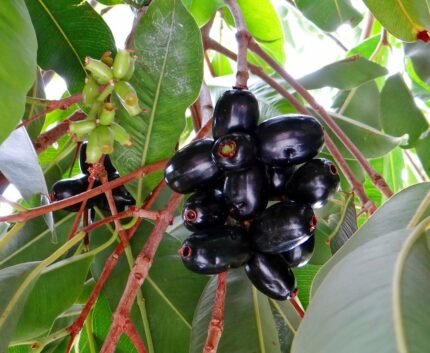Medically reviewed by Dr. Ramesh Gaddam, M.D. — Written by Sumalatha, D.N.H.E
Potential Health Benefits of Java Plum
Java Plum provides several potential health benefits listed below.
1. Antioxidant Properties

Java Plum is rich in antioxidants, particularly polyphenols and flavonoids, which play a crucial role in promoting health and preventing diseases.
These antioxidants help neutralize harmful free radicals in the body, reducing oxidative stress and inflammation.
Here’s a closer look at the antioxidant properties of Java Plum:
Polyphenols
Java Plum contains various polyphenolic compounds such as anthocyanins, ellagic acid, and tannins.
These compounds have been linked to numerous health benefits, including cardiovascular protection, anti-inflammatory effects, and potential anti-cancer properties.
Flavonoids
Flavonoids are another group of antioxidants found in Java Plum, known for their potent antioxidant and anti-inflammatory properties.
These compounds may help protect against chronic diseases such as heart disease, diabetes, and certain types of cancer.
Vitamin C
Java Plum is a good source of vitamin C, an antioxidant that supports immune function, collagen production, and skin health.
Vitamin C also acts as a powerful antioxidant, scavenging free radicals and protecting cells from damage.
By consuming Java Plum regularly, individuals can benefit from its antioxidant properties, which help protect against oxidative damage, support overall health, and reduce the risk of chronic diseases.
2. Blood Sugar Regulation

Java Plum has been studied for its potential to help regulate blood sugar levels, making it beneficial for individuals with diabetes or those at risk of developing the condition.
Here’s a closer look at how Java Plum may contribute to blood sugar regulation:
Impact on Insulin Sensitivity
Java Plum contains bioactive compounds that have been shown to improve insulin sensitivity, allowing cells to more effectively absorb glucose from the bloodstream.
This can help lower blood sugar levels and reduce the risk of insulin resistance, a key factor in the development of type 2 diabetes.
Effect on Blood Glucose Levels
Studies suggest that Java Plum may help lower blood glucose levels by inhibiting the enzymes involved in carbohydrate digestion and absorption.
This slows down the release of glucose into the bloodstream after meals, preventing spikes in blood sugar levels.
Potential Implications for Diabetes Management
The ability of Java Plum to regulate blood sugar levels has important implications for diabetes management.
Incorporating Java Plum into the diet may help individuals with diabetes better control their blood sugar levels and reduce the need for medication.
3. Digestive Health

Java Plum is known for its positive effects on digestive health, primarily due to its fiber content and other bioactive compounds. Here’s an overview of how Java Plum promotes digestive well-being:
High Fiber Content
Java Plum is rich in dietary fiber, with both soluble and insoluble fiber types.
Fiber plays a crucial role in maintaining regular bowel movements, preventing constipation, and promoting overall digestive health.
Promotion of Bowel Regularity
The fiber in Java Plum adds bulk to the stool, making it easier to pass through the digestive tract.
This helps prevent constipation and ensures smooth bowel movements, supporting optimal digestive function.
Prebiotic Properties
Java Plum contains compounds that act as prebiotics, promoting the growth of beneficial gut bacteria.
A healthy balance of gut bacteria is essential for proper digestion, nutrient absorption, and immune function.
Gastrointestinal Health
The bioactive compounds in Java Plum, such as polyphenols and flavonoids, have been studied for their potential to protect against gastrointestinal disorders and inflammation.
These compounds may help reduce the risk of conditions like gastritis, ulcers, and inflammatory bowel disease.
4. Heart Health

Java Plum offers several benefits that support heart health, including its impact on cholesterol levels, blood pressure, and overall cardiovascular function. Here are the key ways in which Java Plum promotes heart health:
Cholesterol Management
Studies suggest that Java Plum may help lower LDL (bad) cholesterol levels while increasing HDL (good) cholesterol levels.
This is attributed to its high fiber content and antioxidant properties, which help remove cholesterol from the bloodstream and prevent its oxidation.
Blood Pressure Regulation
Java Plum contains potassium, a mineral that helps regulate blood pressure by balancing sodium levels in the body and promoting vasodilation (relaxation of blood vessels).
Consuming Java Plum as part of a balanced diet may help lower blood pressure and reduce the risk of hypertension.
Antioxidant Protection
The antioxidants found in Java Plum, including polyphenols and flavonoids, help reduce oxidative stress and inflammation in the cardiovascular system.
By protecting against free radical damage, Java Plum supports the health of blood vessels and reduces the risk of atherosclerosis and heart disease.
Anti-inflammatory Effects
Chronic inflammation is linked to an increased risk of heart disease.
Java Plum’s anti-inflammatory properties may help reduce inflammation in the arteries and cardiovascular tissues, promoting heart health and reducing the risk of heart-related complications.
5. Anti-inflammatory Properties

Java Plum possesses notable anti-inflammatory properties that contribute to overall health and well-being. Here’s an exploration of how Java Plum can help combat inflammation:
Bioactive Compounds
Java Plum contains bioactive compounds such as polyphenols and flavonoids, known for their anti-inflammatory effects.
These compounds help reduce the production of pro-inflammatory molecules in the body, thereby dampening inflammation and its associated effects.
Reduced Oxidative Stress
Inflammation and oxidative stress often go hand in hand.
Java Plum’s antioxidant properties help neutralize free radicals and reduce oxidative stress, which is a major driver of inflammation.
By lowering oxidative stress levels, Java Plum helps mitigate inflammation throughout the body.
Potential Health Benefits
Chronic inflammation is linked to various health conditions, including heart disease, diabetes, and arthritis.
By combating inflammation, Java Plum may offer protective effects against these conditions, as well as support overall health and longevity.
6. Potential Anti-cancer Effects
Java Plum has been studied for its potential role in cancer prevention and treatment, attributed to its rich array of bioactive compounds. Here’s an overview of how Java Plum may exert anti-cancer effects:
Presence of Phytochemicals
Java Plum contains various phytochemicals, including polyphenols, flavonoids, and tannins, which possess antioxidant and anti-cancer properties. These compounds help combat oxidative stress, inhibit the growth of cancer cells, and induce apoptosis (programmed cell death) in cancer cells.
Inhibition of Cancer Cell Growth
Studies have shown that extracts from Java Plum exhibit cytotoxic effects on cancer cells, inhibiting their proliferation and inducing cell death. These effects have been observed in various types of cancer, including breast, colon, prostate, and leukemia.
Anti-inflammatory and Immune-Boosting Effects
Java Plum’s anti-inflammatory properties may help suppress chronic inflammation, which is linked to cancer development. Additionally, compounds found in Java Plum may enhance immune function, aiding the body’s natural defenses against cancerous cells.
Potential Preventive Measure
Consumption of Java Plum as part of a balanced diet may serve as a preventive measure against certain types of cancer. Its antioxidant-rich nature and ability to modulate various cellular processes involved in cancer development make it a promising candidate for cancer prevention strategies.
7. Weight Management

Java Plum can be a valuable addition to a weight management plan due to its nutritional properties and potential effects on satiety and metabolism. Here’s how Java Plum may support weight management:
Low Calorie Density
Java Plum is relatively low in calories but high in fiber, which adds bulk to the diet without contributing excess calories.
This can help individuals feel fuller for longer periods, reducing overall calorie intake and supporting weight loss or weight maintenance efforts.
Satiety Promotion
The fiber content in Java Plum helps promote feelings of fullness and satiety, which may reduce the tendency to overeat or snack between meals.
Including Java Plum in meals or snacks can help curb appetite and prevent excessive calorie consumption.
Improved Metabolism
Some studies suggest that certain compounds found in Java Plum may have beneficial effects on metabolism, potentially increasing the body’s ability to burn calories and fat.
This can contribute to weight loss or prevent weight gain over time.
Nutrient Density
Java Plum provides essential nutrients such as vitamins, minerals, and antioxidants, making it a nutritious choice for those seeking to manage their weight while maintaining optimal health.
Consuming nutrient-dense foods like Java Plum ensures that the body receives essential nutrients without excess calories.
Practical Applications and Culinary Uses

Java Plum offers versatility in culinary applications, making it a valuable addition to various dishes and recipes.
Here’s a closer look at how Java Plum can be incorporated into the diet:
Fresh Consumption
Java Plum can be enjoyed fresh as a standalone snack, providing a sweet and tangy flavor experience. Simply rinse the fruit under running water and consume it whole or sliced.
Juices and Smoothies
Java Plum can be juiced or blended into smoothies to add sweetness, flavor, and nutritional value. Combine Java Plum with other fruits, such as mangoes, berries, or citrus fruits, for refreshing and nutrient-rich beverages.
Jams and Preserves
Java Plum can be cooked down with sugar to make jams, preserves, or fruit spreads. These can be used as toppings for toast, pancakes, or yogurt, adding a burst of flavor and natural sweetness.
Desserts and Baked Goods
Java Plum can be incorporated into various desserts and baked goods, such as pies, tarts, cakes, and muffins. Its natural sweetness and tartness complement a wide range of sweet treats, adding depth of flavor and moisture.
Sauces and Condiments
Java Plum can be cooked down into sauces or chutneys, which can be served alongside savory dishes such as grilled meats, poultry, or fish. These sauces add complexity and balance to savory dishes with their sweet and tangy flavors.
Salads and Salsas
Java Plum can be diced and added to salads or salsas for a unique twist. Its sweet and tart flavor pairs well with savory ingredients like leafy greens, cucumbers, onions, and herbs, adding contrast and complexity to salads and salsas.
Infusions and Beverages
Java Plum can be infused into water, tea, or alcoholic beverages to add flavor and aroma. Simply steep Java Plum slices or pieces in water or alcohol to impart their natural flavors, creating refreshing and flavorful beverages.
Conclusion
Java Plum, with its rich nutritional profile and diverse health benefits, emerges as a valuable addition to a balanced diet.
From its antioxidant properties to its potential effects on blood sugar regulation and digestive health, Java Plum offers numerous advantages for overall well-being.
By incorporating Java Plum into meals, snacks, and culinary creations, individuals can harness its flavor, versatility, and nutritional prowess to support their health goals.
Whether enjoyed fresh, blended into smoothies, or incorporated into savory dishes and desserts, Java Plum adds a delightful touch to culinary experiences while promoting optimal health.
Medically reviewed by Dr. Ramesh Gaddam, M.D.

General Physician, Diabetologist, and Critical Care Specialist.

3 thoughts on “7 health benefits of Java Plum for heart, diabetes and more”
Comments are closed.